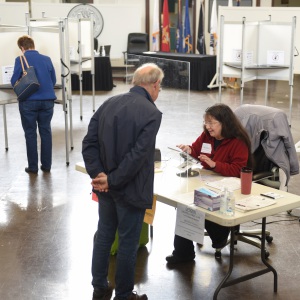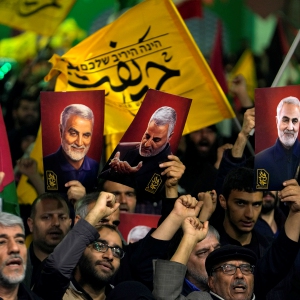Editorial: Deporting Iraqi an affront to American values
| Published: 07-13-2017 9:44 AM |
Anyone looking for evidence of the random cruelty of President Donald Trump’s campaign to deport immigrants need look no further than the case of Niberd Alezendi Abdalla.
Abdalla, 57, joined his family in fleeing their native Iraq four decades ago and has, by all accounts, been leading a productive and responsible life since. In recent years, he has been caring for his ailing parents in Easthampton. He has dutifully reported every six months to federal Immigrations and Customs Enforcement (ICE) officials. He was making plans to, at long last, marry the American woman with whom he had a son 37 years ago.
And now? He waits behind bars at the Suffolk County House of Correction as one of 1,444 Iraqi immigrants nationwide — none of whom has a criminal record — targeted by the Trump administration for deportation.
A potentially grim fate awaits Abdalla in Iraq, reports Gazette staff writer Amanda Drane.
In addition to leaving his elderly parents and fiancee behind, Abdalla could face danger in his home country due to his Kurdish ethnicity, says attorney Buz Eisenberg, who is helping to fight the banishment. And the immigrant’s health issues — severe asthma, recurrent pneumonia and vocal cord dysfunction — require a level of medical care that he may not be able to get in Iraq.
“The consequences could be major,” Eisenberg said after consulting with Abdalla’s physician at Cooley Dickinson Hospital in Northampton. The doctor “doesn’t use the word fatal, but I think that’s what he means.”
As part of Trump’s campaign to deport undocumented immigrants from nations suspected of fomenting terrorism, ICE has targeted 1,444 otherwise law-abiding Iraqis because they are “an easy get,” says Eisenberg. Abdalla was taken into custody on June 8 not because he was doing wrong but because he had shown up for his regular check-in with immigration officials.
“These are anything but rapists and murderers. These are the ones that reported in dutifully,” Eisenberg told about 120 people who gathered outside Northampton City Hall Tuesday for a rally in support of Abdalla. “The most compliant people in the immigrant community — those are the ones they want to send back to uncertain fates.”
Article continues after...
Yesterday's Most Read Articles
 Locking up carbon for good: Easthampton inventor’s CO2 removal system turns biomass into biochar
Locking up carbon for good: Easthampton inventor’s CO2 removal system turns biomass into biochar
 Northampton man will go to trial on first-degree murder charge after plea agreement talks break down
Northampton man will go to trial on first-degree murder charge after plea agreement talks break down
 Police report details grisly crime scene in Greenfield
Police report details grisly crime scene in Greenfield
 Area property deed transfers, April 25
Area property deed transfers, April 25
 Advancing water treatment: UMass startup Elateq Inc. wins state grant to deploy new technology
Advancing water treatment: UMass startup Elateq Inc. wins state grant to deploy new technology
 Super defers Amherst middle school principal pick to successor; one finalist says decision is retaliation for lawsuit
Super defers Amherst middle school principal pick to successor; one finalist says decision is retaliation for lawsuit
Abdalla’s family came here in the 1970s after his father, who had prosecuted members of the ruling Ba’athist party, became a target. As a teenager living on his own in the United States, Abdalla hopped among construction jobs and failed to renew his visa and apply in time for political refugee status, Eisenberg said. Because of his youth and lack of adult guidance, “he didn’t realize the importance of renewing his visa.”
He did, however, fall in love — with Ellen McShane, a young American woman he met in New York City’s Central Park. She became pregnant and had a baby boy, now 37. But due to family objections to mixing their ethnicities, they never married and went on to separate lives, including other marriages that ended.
Seven years ago, the two reunited through Facebook, McShane says. They wanted to marry but delayed those plans because both were caring for ailing parents in different states.
“We were thrilled at this point in our late lives to find one another again and make a plan to be happy,” said McShane, who spoke at Tuesday’s rally. In an earlier interview, Eisenberg said, “What could have been an epic love story is now awash in tragedy.”
The fate of Abdalla and the other Iraqis remains unclear. Groups including the American Civil Liberties Union and the Pioneer Valley Workers Center are coming to the side of Abdalla and the others. Eisenberg took on Abdalla’s cause pro bono as part of his work with the ACLU’s new Immigrant Protection Project, which provides legal help and advice.
The ACLU persuaded a federal court in Detroit to stay the Iraqi deportations pending further judicial review. If a court does not grant him the right to stay, Abdalla might find himself on a plane flying away from the country he calls home and back to a homeland he has long since ceased to know.
Marty Nathan, a physician who treats Abdalla’s parents and knows him as “Bert,” said: “This strikes to our soul as a nation.”
Our nation can do better. It must.

 Charlene Galenski: Blake Gilmore, a strong candidate for Deerfield’s Selectboard
Charlene Galenski: Blake Gilmore, a strong candidate for Deerfield’s Selectboard Annette Pfannebecker: Vote yes for Shores Ness and for Deerfield
Annette Pfannebecker: Vote yes for Shores Ness and for Deerfield Columnist Susan Wozniak: Rising costs long ago swamped hippie ideal
Columnist Susan Wozniak: Rising costs long ago swamped hippie ideal Guest columnist Rudy Perkins: Dangerous resolution pins ‘aggression’ on Iran
Guest columnist Rudy Perkins: Dangerous resolution pins ‘aggression’ on Iran
